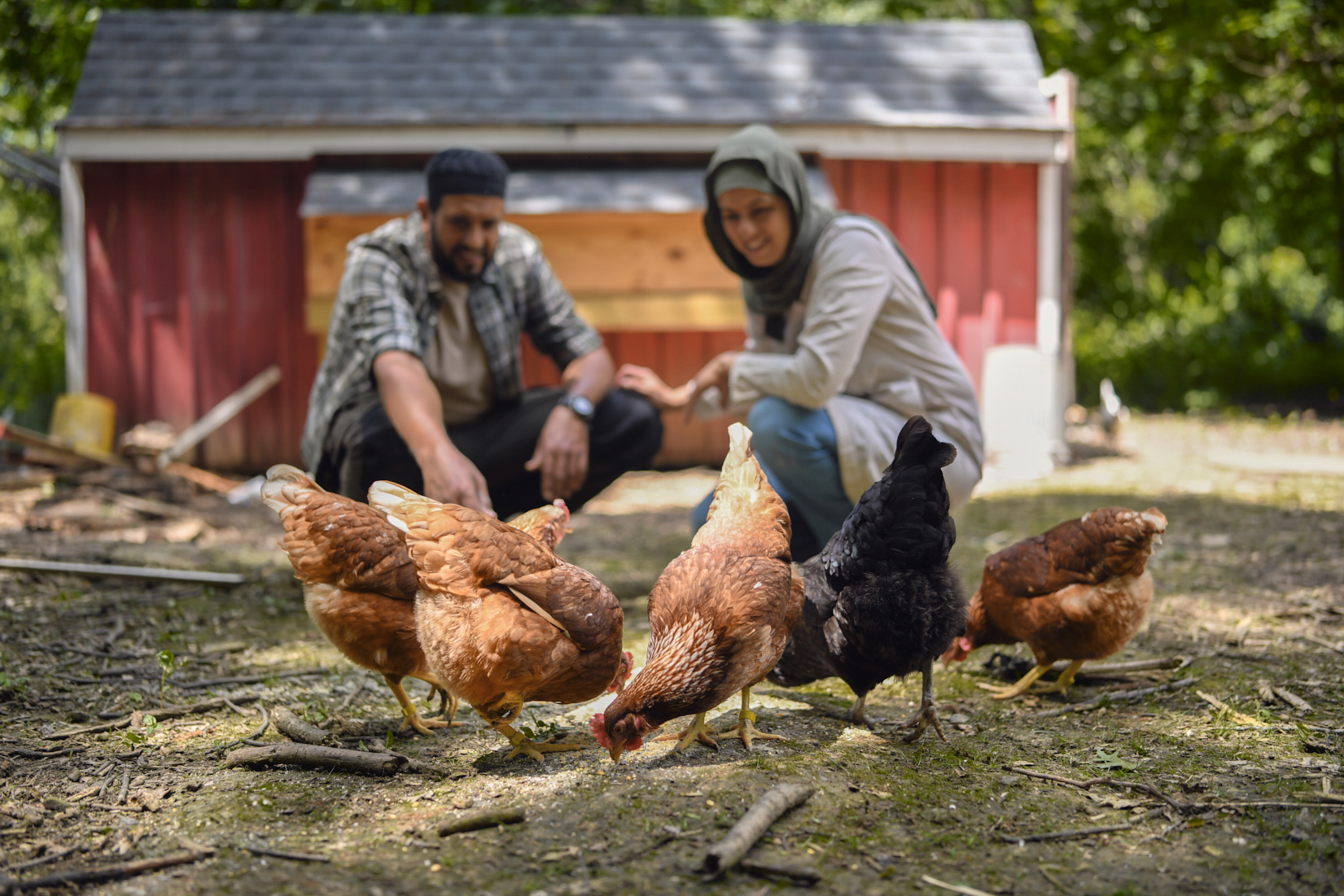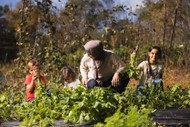Growing Food for the Body and Soul
Posted by Diane Saleh, Halal Pastures on 27th Mar 2022
Read about why we started Halal Pastures in the March/April issue of Islamic Horizons (article provided below). https://islamichorizons.net/
One night my husband, Samer, and I were sitting in our apartment in Queens, N.Y., reading how Egypt had rejected several tons of genetically modified corn coming from the U.S. He was a fund manager, and I had been practicing corporate law. The only label we looked for when shopping was halal. The article made us curious. Why would a country with a largely poor population turn away food?
This was about a decade ago, before most people like us had heard of genetically modified organisms (GMO). We immediately started digging, researching genetically modified foods and learned how unhealthy and even dangerous they could be to our bodies. The Quran commands us to “not alter God’s creation” (4:119). From that point forward, we stopped eating GMO food and even produce and meat coming from farms that used commercial and chemical pesticides, growth hormones and synthetic fertilizers. But the best way to ensure that our family was eating tayyab (pure), was to grow it ourselves. Organically. Halal Pastures was born out of a need to feed our family wholesome food.
Owning and operating a farm is both rewarding and challenging. We have been growing our farm for the last 7 years and God bless, it continues to grow. And since we both continue to work full-time and now have children, there are days when we’re in the field before sunrise or when I’m on the phone with a federal judge while a rooster’s crowing in the background, a warning that a predator is nearby.
Samer always says that family farming means just that — a farm run by a family. By having a family involved, we don’t have to worry so much about labor. Our siblings, parents, friends and cousins have helped us plant hundreds of seeds, till the land, harvest, build our greenhouse and high tunnel — a structure tall enough for a tractor to work in, where plants grow right in the ground as they would in a garden — feed the animals and run the farm’s day-to-day operations.
We had to learn about our land and animals. For example, not all vegetables do well in the same plot. Corn, for example, did not grow well for us. We also have an ongoing battle with cucumber beetles, which seem to love our cucumbers that grow outside. Granted, they have the upper hand because we don’t use chemical pesticides. We had our soil tested for its nutrient composition and tried a variety of seeds to see what grows well and what doesn’t. It took years of trial and error to learn which vegetables blossomed on our land.
We also learned about how animals need to thrive naturally. Watching our goats give birth was one of the more incredible moments to witness. Subhan Allah, a goat can have up to three kids (i.e., babies). The mother cares for her kid just like we care for our children. We would place her and the kid in the barn so they could bond and enjoy some quiet time. It was no different than what a human mother would do with her own newborn. Our daughter Malaak, at that time a toddler, learned about birth from watching this part of life, which to her was just another day on the farm.
The pandemic has been difficult for our farm. Last year, lumber prices increased so much that we had to put off certain projects, such as building a bigger barn and fencing part of the land. The cost of organic grains for chicken feed also increased. Our organic seed deliveries were delayed due to the sheer volume of orders the supplier was receiving, so we ended up planting later in the season. Alhamdu lillah, everything worked out in the end because we were able to sell the vegetables at our farmer’s market. We also have a Community Shared Agriculture (CSA) that allows people to share in our weekly harvest.
The organizations we relied on to help us get started included Stone Barn Farms — a nonprofit farm and educational center — and Cornell Cooperative Extension. They have classes about farming techniques. For example, we learned that adding vinegar and garlic to our chickens’ water keeps them healthy by strengthening their immune systems. There is a plethora of YouTube videos to help troubleshoot issues such as how to keep spider mites from eating the crops grown in the high tunnel. After a lot of research, we learned that their predator was the ladybug. So, we bought 3,000 ladybugs and released them in the high tunnel. Problem solved.
Talking to other experienced farmers, such as Muslim-owned Norwich Meadows Farms, has been great in sharing ways to improve our yields. Haifa and Zaid Kurdieh, one of the most experienced, hardworking, and successful farming couples we have the pleasure of knowing, encouraged us as we learned the ropes.
A big part of what we do is providing certified organic and certified halal meat. Those who come to our farm, regardless of religion, do so because they want food from animals that are raised sustainably and slaughtered humanely. In addition to our own farming, we work with farmers who help raise our animals for slaughter. They are USDA-certified organic and like us, small family enterprises.
We have a very strong relationship with our farmers and share similar philosophies about raising animals humanely, sustainably, organically and naturally. Our cows, lambs, chickens and turkeys are all certified organic. Our livestock is also 100% grass-fed. We are now raising our goat herd and, insha Allah, hope to have certified organic goats as well.
Organic certification is important because it ensures, at a minimum, that the animals and poultry were raised humanely, given non-GMO grains, received no growth hormones and had no contact with any synthetic fertilizers. General USDA guidelines allow animals to be fed with GMO grains and growth hormones and do not ensure they are raised humanely
Obtaining organic certification is a very difficult, long, costly and onerous process that requires multiple audits throughout the year, random testing of animals and very strict recordkeeping that must be shared with the certifying body. But we feel strongly that the organic label is proof that our animals and poultry are raised naturally, humanely and without any hormones or GMO grains. The certification, although challenging, is worth the peace of mind.
Our organic meat is also certified zhabiha halal. We take the slaughtering aspect very seriously. For example, when slaughtering cows, we make sure that they don’t witness each other’s death. Our beloved Prophet (salla Allahu ‘alayhi wa sallam) emphasized the importance of showing mercy to animals while slaughtering them. A hadith relates, “God has ordained kindness (and excellence) in everything. If the killing (of animals) is to be done, do it in the best manner. And when you slaughter, do it in the best manner. Sharpen the knife and put the animal at ease” (“Sahih Muslim”).
Our slaughter crew is Muslim — most often it’s Samer. There are several organizations that certify meat as halal. We chose Halal Food Standards Alliance of America (HFSAA; https://www.hfsaa.org/) as our certifiers because its members are young scholars who share our beliefs that for meat to be halal, it must come from animals that are hand slaughtered while still conscious. HFSAA visited our facilities and watched us slaughter the animals and poultry. Their certificate is proof that we’re following the Divine guiding principles and the Prophet.
According to the U.S. Department of Agriculture’s (USDA) Economic Research Service, about 89% of the country’s small farms rely on non-farm-related work to supplement their household income. Samer and I continue to work full-time jobs to support our farming endeavor. But we also learned quickly that farming isn’t a part-time job. There were many days when we started at 5 a.m. and finished at midnight. For example, seeds planted in the seedling greenhouse need to be checked on throughout the day to make sure that they have enough water and heat.
The animals, especially if they are pregnant, need continual monitoring. Crops, if they aren’t harvested, will get enormous or just rot. During the summer and fall months, we harvest every day, rain or shine. But this hectic lifestyle is worthwhile because we’re committed to making good food for our family and community. My children eat food that we grow from a labor love, and the food we’re putting out into the world is wholesome.


